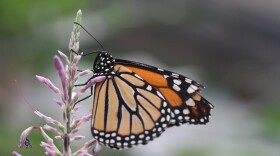-
A laboratory run by Colorado State University is devoted to the study of chocolate: how it’s made, how to create new varieties, and why people can’t get enough of those Valentine’s Day chocolates.
-
As temperatures increase and snowpack declines, many alpine plants are at risk of extinction. Though adapted to harsh environments, the rate of change occurring in the mountains is concerning for researchers.
-
Around the world, venomous snakebites kill tens of thousands of people each year. Antivenom can be an effective treatment, but it’s expensive and difficult to produce. A biologist at the University of Northern Colorado hopes to change that, with a new type of antivenom that’s cheaper to produce in large amounts. He discusses his research and recent breakthrough.
-
For 20 years, a Boulder duo known as “Jeff and Paige” have performed interactive songs about nature and science for children. And now they plan to bring their live performances to a TV show called “Rainbow Socks.” Jeff and Paige share how they approach making the outdoors fun for kids.
-
Scientists who study the deepest parts of the ocean may soon harness unusual new technology that’s being developed at CU Boulder. Researchers there fit tiny electric devices onto live jellyfish, so scientists can steer them into remote places where humans can’t easily go. We hear more about this research into robotic jellyfish.
-
The Bird Conservancy of the Rockies has tracked migrating birds at a banding station at Barr Lake State Park for decades to understand their annual life cycle and habits — before it's too late.
-
If you had pets growing up, your body might be better equipped to respond to stress as a result. A new study out of the University of Colorado shows that pets help our immune systems by exposing them to helpful microbes. And those microbes reduce inflammation caused by stress.
-
If you have a drip tray under your fridge that’s filled with orange goo, a CSU scientist might be interested in hearing about it. A researcher there collects samples from people’s appliances like air conditioners and hot water heaters – and says the organisms could hold solutions to climate change and pollution.
-
Each year, the Butterfly Pavilion works with citizen butterfly observers to track the state’s butterfly populations. And the data they’ve collected shows that butterflies are declining in Colorado.
-
Scientists and local volunteers are participating in a BioBlitz in Louisville. It’s an effort to document every kind of species to understand what's out there and what needs protection.

Play Live Radio
Next Up:
0:00
0:00
Available On Air Stations










